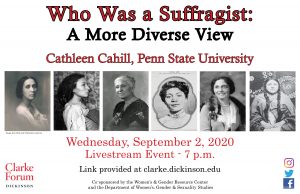 Penn State University
Penn State University
Who Was A Suffragist: A More Diverse View
Wednesday, September 2, 2020
Virtual program on YouTube live, 7 p.m.
This lecture reveals the hidden histories of the Native American, Chinese American, African American, and Hispanic suffragists who not only challenged women’s inequality but also fought against the racial prejudices of the age. They marched in parades, debated with national suffrage leaders, and met with presidents and other politicians. They insisted that women in their communities also deserved the vote.
This program is sponsored by the Clarke Forum for Contemporary Issues and co-sponsored by the Women’s & Gender Resource Center and the department of women’s, gender & sexuality studies.
Overview of topic written by Amanda Sowah ’22
Biography (provided by the speaker)
Cathleen Cahill is a social historian who explores the everyday experiences of ordinary people, primarily women. She focuses on women’s working and political lives, asking how identities such as race, nationality, class, and age have shaped them. She is also interested in the connections generated by women’s movements for work, play, and politics, and how mapping those movements reveal women in surprising and unexpected places. She is the author of Federal Fathers and Mothers: A Social History of the United States Indian Service, 1869–1932 (University of North Carolina Press, 2011), which won the Labriola Center American Indian National Book Award and was a finalist for the David J. Weber and Bill Clements Book Prize. She is currently engaged in two book projects. Recasting the Vote: How Women of Color Transformed the Suffrage Movement (forthcoming Fall 2020) follows the lead of feminist scholars of color calling for alternative “genealogies of feminism.” It is a collective biography of six suffragists–Yankton Dakota Sioux author and activist Gertrude Bonnin (Zitkala-Ša); Wisconsin Oneida writer Laura Cornelius Kellogg; Turtle Mountain Chippewa and French lawyer Marie Bottineau Baldwin; African American poet and clubwoman Carrie Williams Clifford; Mabel Ping Hau Lee, the first Chinese woman in the United States to earn her PhD ; and New Mexican Hispana politician and writer Nina Otero Warren–both before and after the ratification of the Nineteenth Amendment. Her next project, Indians on the Road: Gender, Race, and Regional Identity reimagines the West Coast through the lens of Indigenous people’s relationships with the transportation systems that bisected their lands, forming corridors of conquest and environmental change while simultaneously connecting them in new and sometimes empowering ways to other people and places.
Video of the Presentation

